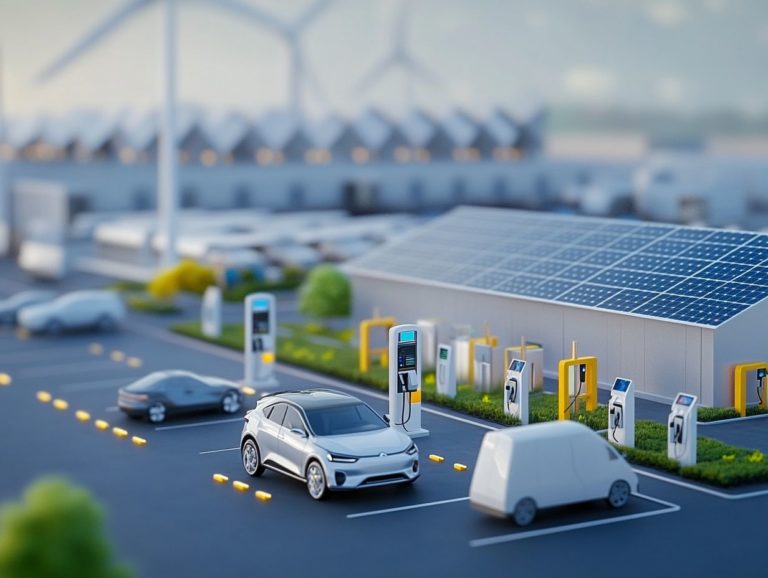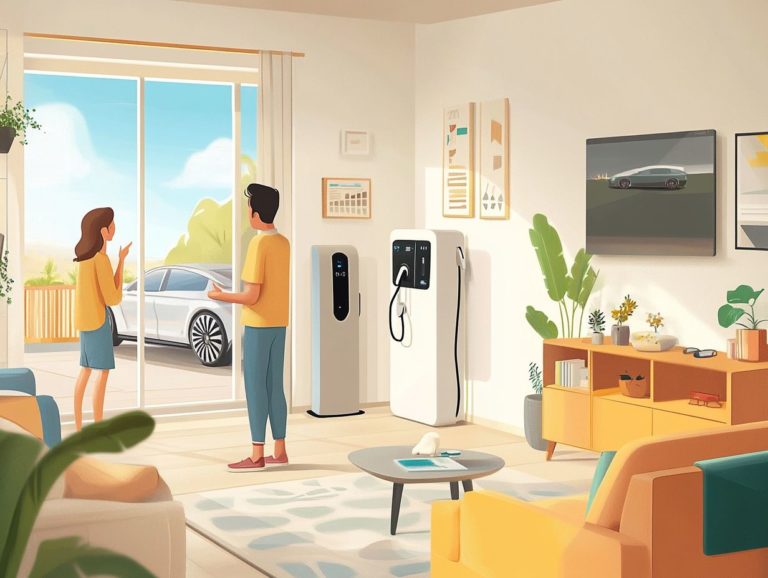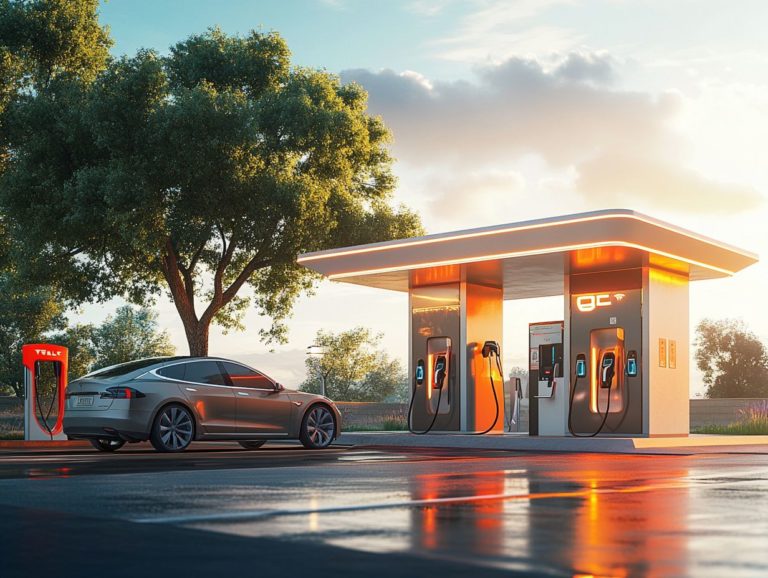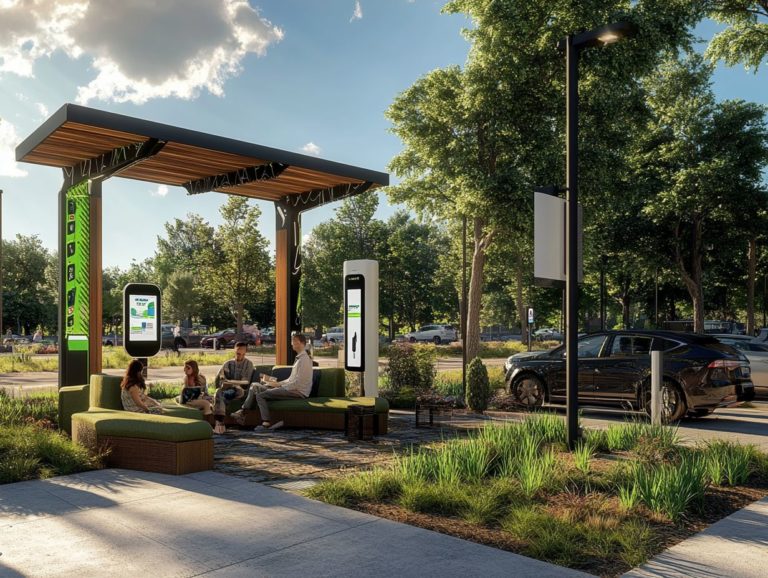5 Emerging Trends in EV Charging Technology
As electric vehicles (EVs) gain momentum in the market, you ll notice a rising demand for innovative charging solutions. This article explores five trends in EV charging technology that will transform how you power your vehicle.
From wireless charging to solar-powered stations, these advancements will boost your EV experience.
Discover how these technologies enhance efficiency and address challenges in EV ownership!
Contents
- Key Takeaways:
- 1. Wireless Charging
- 2. Vehicle-to-Grid Technology
- 3. Ultra-Fast Charging
- 4. Solar-Powered Charging Stations
- 5. Smart Charging
- How Will These Technologies Impact the EV Industry?
- What Are the Benefits of Wireless Charging for EVs?
- How Can Vehicle-to-Grid Technology Improve the EV Charging Experience?
- What Are the Challenges of Implementing Ultra-Fast Charging?
- How Can Solar-Powered Charging Stations Help with the Adoption of EVs?
- What Is Smart Charging and How Can It Make EV Charging More Efficient?
- What Are the Potential Drawbacks of These Emerging Technologies?
- What Are the Future Possibilities for EV Charging Technology?
- How Can Consumers Prepare for These Changes in EV Charging?
- What Are the Environmental Impacts of These Technologies?
- How Will These Trends Affect the Overall Cost of EV Ownership?
- Your Questions About EV Charging Answered!
- What are the 5 emerging trends in EV charging technology?
- What is wireless charging and how does it work?
- How does fast charging differ from regular charging?
- What is two-way charging and how is it used?
- How does vehicle-to-grid integration benefit both EV owners and the grid?
- What is smart charging and how does it optimize the charging process?
Key Takeaways:
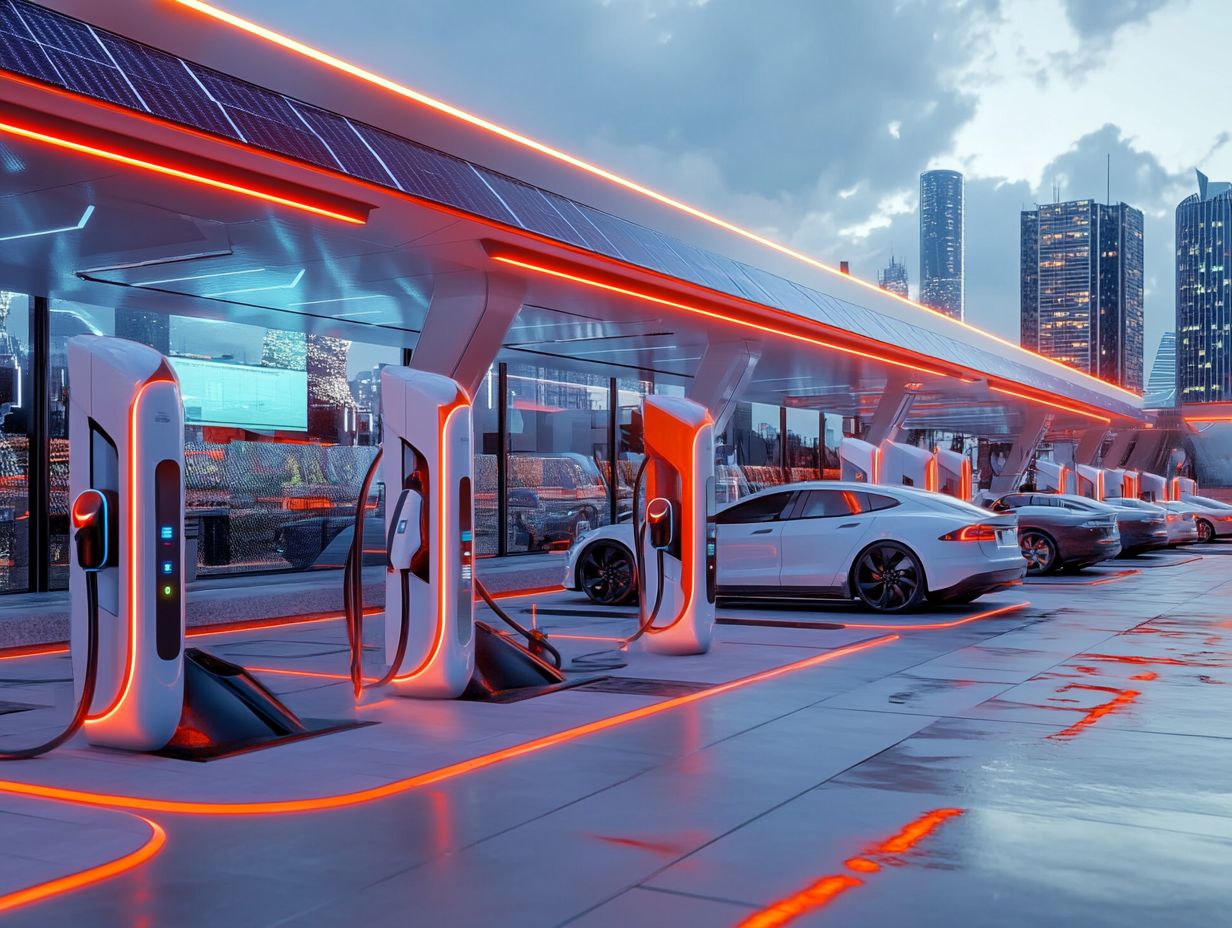
- Wireless charging offers convenience, eliminating the need for cords and plugs.
- Vehicle-to-grid technology allows EVs to charge and send energy back to the grid.
- Ultra-fast charging reduces charging time for long trips!
1. Wireless Charging
Wireless charging is a big improvement in the EV market. It offers you an innovative and convenient way to enhance your experience while managing energy efficiently.
This advanced technology removes the hassle of cables, allowing you to recharge seamlessly. You can simply park your vehicle over a charging pad without dealing with plugging in cables.
Leading manufacturers like Tesla are integrating this tech in their latest models, showcasing its benefits. You may wonder about efficiency and charging station availability advancements are being made to address these concerns!
2. Vehicle-to-Grid Technology
Vehicle-to-Grid (V2G) technology changes how your electric vehicle interacts with the electric grid. By allowing your EV to send energy back during peak demand, it supports renewable energy and lowers your charging costs!
This system lets you be a mini power plant, supplying energy during high-usage times. It strengthens the electric grid and relies less on fossil fuels.
Some may have reservations about reliability, battery wear, or compensation for energy contributions. Addressing these with robust technology and user-friendly policies will be essential for trust and adoption.
3. Ultra-Fast Charging
Ultra-fast charging technology is revolutionizing the electric vehicle (EV) market, drastically slashing charging times and elevating your overall experience at dedicated EV charging stations. This new infrastructure allows you to recharge your EV much faster than traditional chargers, making long road trips not just feasible, but genuinely enticing.
As we explore ultra-fast charging, you ll discover the myriad benefits, the challenges that lie ahead, and the pivotal role EV manufacturers play in rolling out these advanced features. For you, the convenience of ultra-fast charging means spending less time stuck at stations and more time enjoying the journey or focusing on what really matters.
Technological advancements, like enhanced battery chemistry and high-capacity chargers, are key players in delivering significant time savings. To fully harness this promising technology, substantial investments in charging networks and smart grid solutions are paramount.
Challenges remain, including the hefty costs tied to building this infrastructure and concerns about battery longevity. Tackling these issues will be essential as the industry strides toward broader acceptance of ultra-fast charging solutions.
4. Solar-Powered Charging Stations
Solar-powered charging stations present a sustainable and innovative solution for electric vehicle (EV) owners like you, tapping into renewable energy to provide charging options that perfectly align with your eco-friendly lifestyle. By embracing solar technology, these charging stations help reduce the carbon footprint linked to traditional energy sources and enhance your overall experience by ensuring a reliable energy supply.
With the integration of photovoltaic cells, these stations convert sunlight into electricity that you can use directly or store for future needs, giving you access to clean energy right at your fingertips. Beyond promoting a greener environment, you’ll also enjoy significant savings on energy costs, especially as the price of conventional electricity can be unpredictable.
While the potential benefits are substantial, challenges such as high initial investments and the space required for solar panels still pose obstacles for widespread adoption. However, looking ahead, the future of solar energy in the EV sector looks exciting!
Now is the time to embrace solar energy for your EV!
5. Smart Charging
Smart charging technology is transforming the electric vehicle (EV) charging experience, offering you a sophisticated framework that enhances energy management and optimizes charging systems for a more enjoyable interaction. By leveraging advanced technologies and protocols like OCPP 2.0.1 (a communication protocol for EV charging stations), smart charging solutions enable charging that adjusts based on current needs, reflecting recent trends in electric vehicle charging stations.
In this section, you’ll delve into the intricacies of smart charging, its myriad benefits, and its integral role in the broader landscape of electric mobility.
This innovative approach not only addresses your concerns about the reliability and efficiency of charging stations but also seamlessly integrates with the electric grid to champion energy sustainability. You can take advantage of lower energy costs by charging during off-peak hours, helping to balance energy demand and relieve stress on the grid.
EV manufacturers and charging service providers are increasingly working together to enhance these systems, ensuring that your charging experience is both intuitive and dependable. This collaboration paves the way for smarter, more connected infrastructure, ultimately creating a user-friendly environment that prioritizes your convenience and peace of mind as an electric vehicle owner.
How Will These Technologies Impact the EV Industry?

The rise of technologies such as wireless charging, Vehicle-to-Grid (V2G), ultra-fast charging, solar-powered charging stations, and 5 must-have features in an EV charger is poised to revolutionize the electric vehicle (EV) industry. It ushers in an era defined by convenience and sustainability.
As you observe these innovations being woven into the EV market, you ll find that they enhance not only the user experience but also improve energy management and elevate customer satisfaction throughout the charging infrastructure.
This change goes beyond just the vehicles. It extends into a broader ecosystem fueled by consumer demand for greener alternatives. The more these solutions gain traction, the more enticing electric vehicles become to potential buyers, ultimately driving up sales and creating a vibrant marketplace.
Infrastructure development is gearing up to keep pace with this evolution. Strategic placement of charging stations and networks will enable seamless travel. However, challenges like standardization, initial implementation costs, and grid stability may surface. Thoughtful planning and collaborative efforts among stakeholders will be required to facilitate a smooth transition into this electrified future.
What Are the Benefits of Wireless Charging for EVs?
Wireless charging brings a wealth of benefits to electric vehicles (EVs). It enhances your experience and fosters the adoption of innovative charging solutions in the EV market. By eliminating the hassle of traditional plugs, wireless charging simplifies the process, making it more convenient for you and boosting overall satisfaction.
Imagine charging your vehicle without any hassle! You can simply park your car and let it charge without the fuss of tangled cables. This effortless approach not only alleviates frustration but also promotes a seamless experience.
Safety stands as another significant advantage; without cords in the mix, you reduce the risk of tripping hazards or electrical issues. This technology also connects with your smart home setup, allowing your vehicle to communicate with your home energy systems for optimal charging.
Any concerns you may have regarding battery health and charging rates can be effectively addressed. Many wireless systems provide smart feedback, ensuring that optimal conditions are maintained.
This innovation not only enhances your overall EV ownership journey but also paves the way for a greener future.
How Can Vehicle-to-Grid Technology Improve the EV Charging Experience?
Vehicle-to-Grid (V2G) technology allows electric vehicles to send energy back to the grid while drawing energy during peak demand. This dynamic interaction enhances energy management and sustainability, ultimately leading to greater customer satisfaction through reduced charging costs and encouragement of renewable energy use.
By participating in this smart energy exchange, you can lower your electricity bills while earning money from grid services. The capability to store energy generated from renewable sources, such as solar and wind, gives you the power to achieve greater energy independence, significantly decreasing your reliance on fossil fuels.
While the potential of V2G is indeed compelling, it’s important to acknowledge some challenges, such as concerns over battery wear and the initial costs associated with setup. Addressing these issues will be vital to fostering consumer confidence in embracing this innovative technology.
What Are the Challenges of Implementing Ultra-Fast Charging?
While ultra-fast charging offers a wealth of advantages for electric vehicles (EVs), it also brings forth considerable challenges that need to be addressed to enhance user experience and facilitate widespread adoption. These hurdles encompass the hefty costs of establishing the necessary charging infrastructure. Additionally, there is a need for compatibility across various EV models, along with concerns about charging time and reliability.
In this discussion, you ll explore the obstacles that EV manufacturers and charging service providers encounter in deploying ultra-fast charging solutions.
The initial investment for building a wide range of charging stations can be intimidating. This often discourages potential investors and stakeholders from diving in. The lack of standardization among different vehicle manufacturers complicates the creation of universal charging solutions. This can be incredibly frustrating for users who find themselves unable to charge their vehicles at certain stations.
A crucial aspect is the ongoing need for technological advancements that enhance charging speeds while ensuring safety and efficiency. To address these challenges, it’s important to explore how charging infrastructure is evolving globally by implementing robust strategies, such as public-private partnerships, government incentives, and collaborative industry standards.
By fostering innovation and cooperation, we can streamline the overall charging experience, ultimately encouraging more consumers to make the switch to electric vehicles.
How Can Solar-Powered Charging Stations Help with the Adoption of EVs?
Solar-powered charging stations play a vital role in your journey toward adopting electric vehicles (EVs). They offer an eco-friendly charging solution that harnesses renewable energy. By addressing concerns about energy supply and sustainability, these exciting technologies can transform your driving experience! In this discussion, you ll discover the benefits and challenges of solar-powered charging stations within the broader framework of EV adoption.
These stations capture sunlight through photovoltaic panels, transforming it into electricity that can either be stored or used immediately to charge EV batteries. The environmental advantages are noteworthy; solar energy reduces reliance on fossil fuels, cuts greenhouse gas emissions, and contributes to cleaner air quality. By integrating solar charging into existing infrastructures, you ll enjoy lower operational costs, making it an appealing choice whether you re an individual or a business owner.
However, there are some limitations to consider, such as the initial installation costs and dependency on weather conditions. Looking ahead, advancements in solar technology promise to enhance efficiency and battery storage, further increasing the allure of this sustainable solution for everyone.
What Is Smart Charging and How Can It Make EV Charging More Efficient?
Smart charging represents an advanced approach to electric vehicle (EV) charging that optimizes the process using real-time data and energy management systems, leading to enhanced efficiency and user satisfaction. By leveraging protocols like OCPP 2.0.1, which is a protocol that helps charging stations communicate with each other and with the electricity grid, smart charging solutions can adjust to grid conditions and your specific needs. This ensures that your electric vehicle charges at the most advantageous times.
In this section, you will discover how smart charging technology elevates overall charging efficiency and enriches your customer experience.
This innovative technology not only streamlines the charging process but also offers significant cost savings by enabling you to capitalize on off-peak electricity rates. The convenience of scheduling charges around your personal routines guarantees that you will always have a fully charged vehicle at your disposal when you need it.
On a larger scale, these systems enhance the dynamics of the electric grid by balancing supply and demand, thereby reducing strain during peak hours.
However, challenges remain, such as the necessity for widespread infrastructure upgrades and the integration of diverse energy sources. We need to work together to overcome these challenges and unlock the full potential of smart charging.
What Are the Potential Drawbacks of These Emerging Technologies?
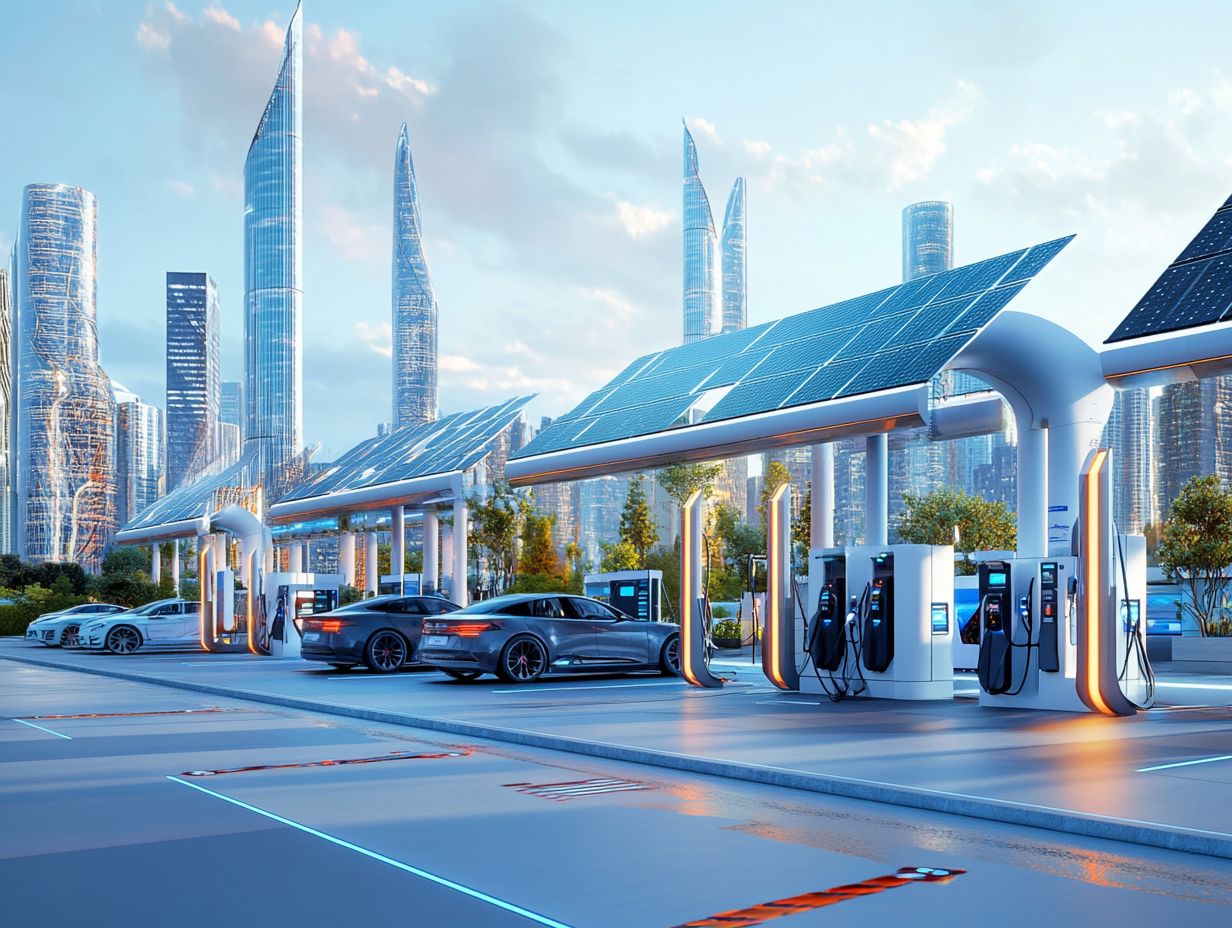
While emerging technologies like wireless charging, V2G, ultra-fast charging, solar-powered charging stations, and smart charging present exciting opportunities, they also bring potential drawbacks that could influence your acceptance and overall satisfaction as a user. Understanding these aspects is crucial for grasping the future of EV charging infrastructure development.
You might have concerns regarding the cost of implementation, compatibility with existing systems, and your anxiety about reliability. You need to address these issues. This will help build your confidence in new charging solutions. A critical analysis of the drawbacks of these technologies and their implications for the EV market will unfold here.
The high costs associated with setting up advanced charging infrastructure can be daunting for businesses and municipalities. This may deter widespread adoption. Regulatory challenges, including inconsistent standards and policies across various regions, create hurdles for developers and operators striving to establish reliable charging networks.
Your skepticism about the performance and safety of these innovative solutions looms large. We need to educate the public to overcome this skepticism through effective public education and transparent communication strategies.
By addressing these concerns through collaborative efforts among stakeholders, innovative financing models, and clear consumer education, the industry can lay a sustainable foundation for the future growth of the EV charging landscape.
What Are the Future Possibilities for EV Charging Technology?
The future of electric vehicle (EV) charging technology is overflowing with potential, fueled by innovative advancements that enhance both sustainability and user experience. As you navigate the evolving EV market, emerging technologies like battery swaps, better energy management systems, and improved charging infrastructure are set to redefine your engagement with electric mobility. Let’s discover the latest on EV charging technology and what these exciting future developments mean for you and the industry.
Thanks to breakthroughs in battery technology, charging speeds are getting faster. You ll spend less time waiting at stations. Coupled with the expansion of charging networks in both urban and rural areas, your experience will be seamless and accessible.
Smart grids and the integration of renewable energy are leading the way for sustainable charging solutions, reducing our collective reliance on fossil fuels. These trends promise convenience and efficiency for today’s EV owners while laying the groundwork for a greener future that emphasizes environmental responsibility, as highlighted in the latest developments in EV charging networks.
How Can Consumers Prepare for These Changes in EV Charging?
As the electric vehicle (EV) landscape undergoes a significant transformation with the emergence of innovative charging solutions, you must equip yourself with the knowledge and strategies necessary to navigate these changes effectively. Staying informed about 5 innovations to look out for in EVs and understanding the implications of emerging technologies and how they integrate into existing charging infrastructure will be crucial for maximizing your experience.
Let s dive into practical steps you can take to prepare for these exciting changes! One essential tip is to regularly follow industry news; staying informed about advancements will help you make educated choices regarding your charging needs.
It’s also important to familiarize yourself with the various charging options available, including fast chargers, destination chargers, and home installations. Evaluating the convenience and feasibility of setting up a home charging station can significantly enhance your overall EV ownership experience.
With charging technology evolving rapidly, being proactive is essential to reap the benefits! Being open to adapting will empower you to fully embrace the future of sustainable transportation.
What Are the Environmental Impacts of These Technologies?
The environmental impacts of emerging electric vehicle (EV) charging technologies are significant, as they not only help reduce carbon emissions but also encourage the adoption of renewable energy sources.
By harnessing solar energy and other renewables, these technologies notably decrease your reliance on fossil fuels. This is vital in the fight against climate change.
Integrating these systems into existing infrastructure promotes energy independence and can stabilize local energy grids. However, challenges persist, including the environmental costs linked to resource extraction necessary for manufacturing these technologies.
Additionally, the infrastructure development needed for widespread deployment presents obstacles. Balancing these factors efficiently is essential for maximizing the positive impacts while addressing the challenges in a meaningful way.
How Will These Trends Affect the Overall Cost of EV Ownership?
The trends in electric vehicle (EV) charging technology are set to significantly impact the overall cost of EV ownership. You will see potential savings through game-changing EV technologies and an enhanced user experience.
As charging infrastructure evolves, get ready for benefits like reduced charging costs, improved energy management, and greater access to renewable energy sources. Each of these contributes to long-term savings and greater satisfaction.
Expect advancements in charging efficiency to decrease the time spent at charging stations. This makes the experience more convenient and encourages broader adoption.
Infrastructure development, including the expansion of fast-charging networks and the integration of smart technologies, plays a vital role in enabling you to charge your vehicle more efficiently. This helps minimize downtime.
From your perspective, these enhancements can lead to a more affordable EV market. Here, the perceived economic benefits outweigh initial investments, making electric vehicles an increasingly appealing choice for the average driver.
Your Questions About EV Charging Answered!
What are the 5 emerging trends in EV charging technology?
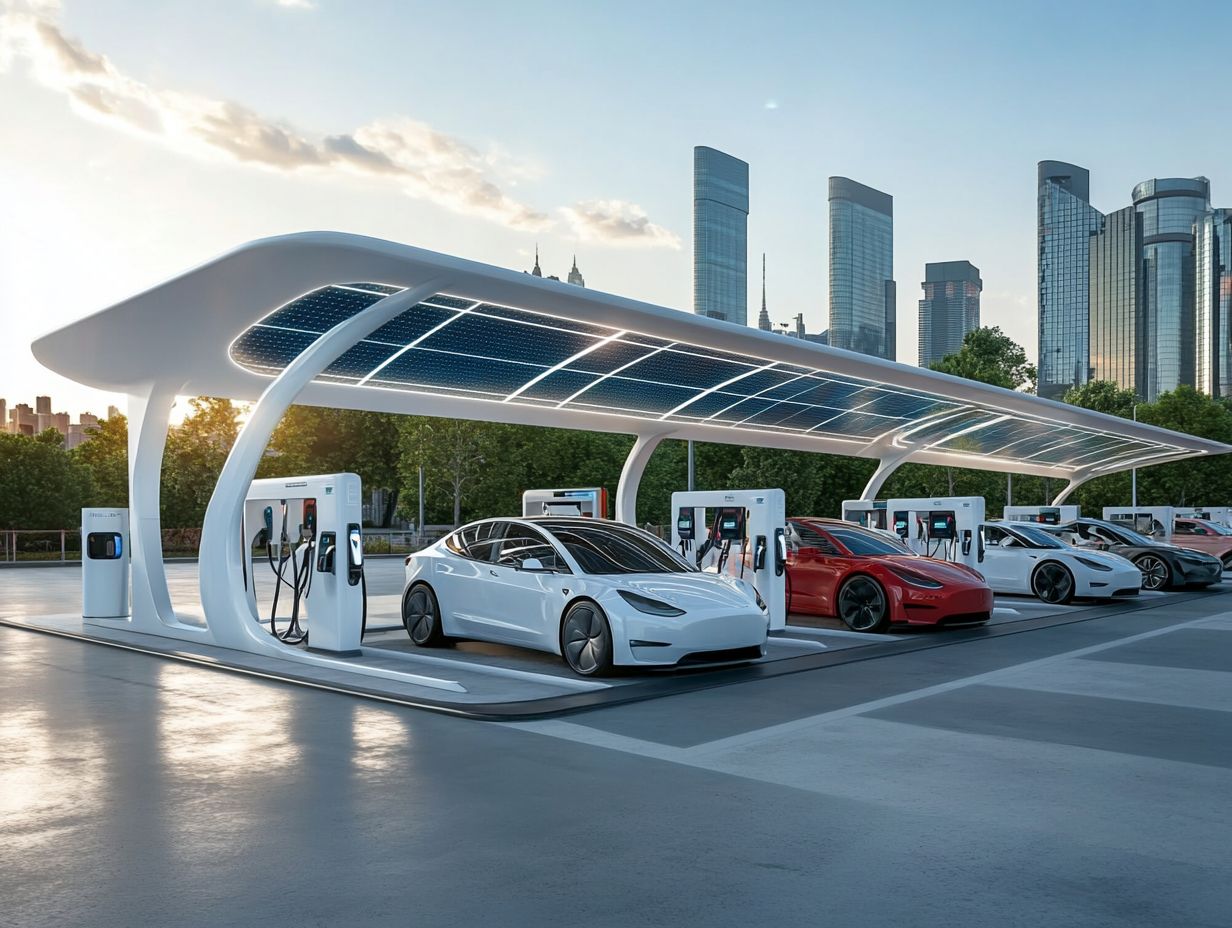
The 5 emerging trends in EV charging technology include wireless charging, fast charging, two-way charging, vehicle-to-grid integration, and smart charging.
What is wireless charging and how does it work?
Wireless charging uses magnetic fields to transfer energy from a charging pad to the vehicle’s battery. It eliminates the need for cables and plugs, providing a more convenient and user-friendly charging experience.
How does fast charging differ from regular charging?
Fast charging, also known as high-speed charging, allows an electric vehicle to be charged at a much higher rate than traditional AC charging. This enables a vehicle to be charged up to 80% in just 30 minutes, making it more suitable for longer journeys.
What is two-way charging and how is it used?
Two-way charging, also known as vehicle-to-grid (V2G) technology, allows electric vehicles to not only charge from the grid but also to discharge energy back to the grid. This enables EVs to act as energy storage devices, providing electricity during peak demand periods.
How does vehicle-to-grid integration benefit both EV owners and the grid?
Vehicle-to-grid integration benefits EV owners by allowing them to earn money by selling excess energy back to the grid. It also benefits the grid by providing a source of renewable energy and helping to balance demand and supply.
What is smart charging and how does it optimize the charging process?
Smart charging uses advanced algorithms and communication systems to optimize the charging process. It takes into account factors such as energy prices, grid demand, and vehicle usage patterns to ensure efficient and cost-effective charging for both the EV owner and the grid.
For more information about EV technologies and to consider making the switch to an electric vehicle, explore our additional resources!

